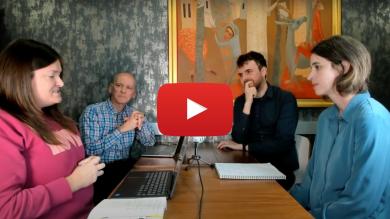Author: Bible Society, 29 November 2022
The latest Census results show that there’s been a big fall in the number of people identifying as Christian in England and Wales over the last ten years, from 33.2 million in 2011 to 27.5 million today. That means we’ve dropped to under 50 per cent of the population.
But this is far from the whole story. It means that when other religions are included, more than half the population claims a religious identity. This is ‘notably high’, according to Bible Society’s Head of Research, Dr Rhiannon McAleer. And in spite of the decline, she says: ‘The Census definitely does not show that we are living in a society that has turned its back on religion.’
However, she adds that ‘religious identity is changing. This reflects other data and is not a surprise.’
So why the decline?
‘It may be that people are less willing to wear a label that doesn’t accurately describe them. It’s not necessarily that they have lost a genuine and heart-felt faith,’ Dr McAleer says. ‘There’s also far more permission for people to admit that they don’t identify as Christians; they don’t have to claim a faith they don’t actively hold in order to win social approval.’
 Watch Dr McAleer in conversation with Bible Society staff exploring these issues further.
Watch Dr McAleer in conversation with Bible Society staff exploring these issues further.
In fact, many people are generally quite comfortable with the idea of a national Christian identity. One sign of that is the support expressed for Christian elements in royal events; a Bible Society survey conducted by YouGov following the Queen’s funeral found that only 15 per cent of the population think state royal events such as weddings and funerals should be wholly secular in future, and that 72 per cent felt Christian language and imagery was appropriate at the funeral.
Dr McAleer also says that a decline in the number declaring a Christian faith identity did not translate into an increase in the number of declared atheists. A massive Bible Society research project undertaken with YouGov found that between 2018 and May 2022 there was a statistically significant decline in those saying they do not believe in God, while those saying they do believe has stayed the same.
More recent polling in October suggests belief in God may even have risen. And among those who say they have no religion or faith, 11 per cent say there is definitely or probably a God, while a further 17 per cent say they do not know – indicating that the ‘no religion’ choice doesn’t necessarily indicate an atheist position. So the potential for mission among people who don’t have a faith is very considerable.
We’ve also found that churchgoing has been broadly stable over the last four years, in spite of the disruption of the pandemic. Our research in 2018 found that around 10 per cent of the population of England and Wales said they attend church at least monthly, with seven per cent attending weekly. When the survey was repeated in 2022 it found similar results. This runs completely counter to the generally accepted idea that the Church is in serious decline, and ought to encourage us as we think about mission in our communities.
So, says Dr McAleer: ‘Our data challenges the idea that religion in general and Christianity in particular is in inexorable decline in England and Wales.
‘The picture is much more nuanced than that. In some areas of our society, and in some sections of the Church, decline is very marked. However, this is offset by growth in other areas.
‘The fact that churchgoing appears to be stable runs against the accepted narrative of decline. The Census results should be seen in the light of this.’
And, she says: ‘After many years during which the forthcoming extinction of Christianity has been confidently predicted, this is a notably high proportion which ought to provoke us to think more deeply about what is actually happening to faith in England and Wales.
‘Religious practice and identity – both Christian and non-Christian – is mainstream, and policy-makers cannot assume that religious voices should be absent from the public square.’
And for Bible Society’s Director of Domestic Mission Nigel Langford, the Census figures represent an opportunity, not a threat. He says: ‘It’s not a bad thing that people are saying they don’t really connect with or have much faith in the traditional Church. In our call to re-imagine Bible mission we are challenging the Church not to go back to that way of being and doing.
‘I feel encouraged that the mood in the nation represents an opportunity for the Church to connect with people in a spiritually open environment.’
Bible Society worked with YouGov to conduct a survey of 19,101 adults in England and Wales in October and November 2018. A boost sample of churchgoing Christians was included to ensure adequate response numbers for this group. The data were subsequently weighted back to national proportions to ensure results are representative of the overall population. Subsequent polling with the same survey was conducted in May 2022 with a sample of 3,845 adults in England and Wales, and in October 2022 with a sample of 3,035 adults in England and Wales with tracker questions included as part of a survey on a different theme. These surveys were conducted online.
Share this:


Caring for creation in Costa Rica

Change a child's life with the Bible